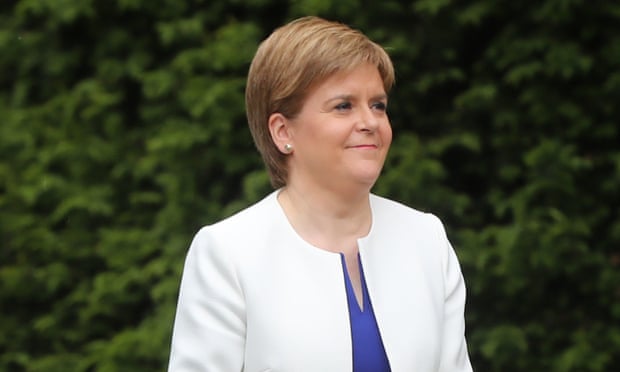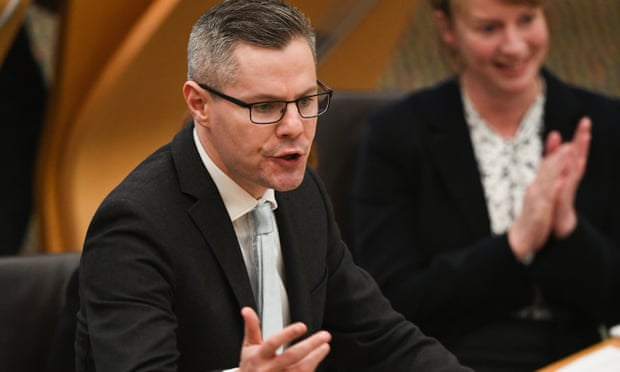The colossal columns that make up Edinburgh's unfinished National Monument are a good metaphor for the Scottish dream of independence.
Unfinished, yes, but still standing — impossible to ignore and a constant in the Scottish landscape as it sits perched on Calton Hill, overlooking the city.
Commissioned as a monument to the soldiers who died in the Napoleonic Wars, its foundations were laid in 1822. But money soon ran out and locals dubbed it "Edinburgh's disgrace."
Whether Scotland's nationalists will be able to do anything about the unfinished part of that metaphor is now a question of considerable speculation against the backdrop of the political chaos over Brexit playing out in Parliament.
Sixty-two per cent of Scots voted to remain in the European Union in Britain's 2016 referendum.
And many have looked on in horror as British Prime Minister Boris Johnson has tried
to bulldoze the United Kingdom out of the EU by the end of October — with or without a formal agreement.
"I feel pretty pissed off, really," said Lesley McDonald, out for a walk along Edinburgh's Royal Mile. "Scotland is much more socially democratic, I believe. For many years, Scotland has felt underrepresented in Westminster."
McDonald said she was among the 55 per cent of Scots who rejected independence in a 2014 referendum on the topic, the only one in her family to do so.
But because of Brexit, she's since changed her mind.
"I feel almost cornered now," she said. "If it's being part of the U.K. or being part of Europe, I feel then it has to be Europe. So, yes, I would vote for independence now."
Polls hint at change
She's not alone.
A
YouGov poll released this week put support for Scottish independence at 49 per cent. But it also found that 45 per cent of those surveyed want another referendum on independence in the next five years, compared to the 44 per cent who don't.
And
an opinion survey conducted in August by pollster Michael Ashcroft found a majority now backs independence, with 46 per cent of Scots in favour, compared to 43 per cent against.
Nicola Sturgeon, Scotland's first minister and leader of the pro-independence Scottish National Party (SNP), has said she wants to see another referendum by 2021. But in order to hold one, she would require a transfer of authority from Westminster.
"It is anti-democratic of any politician in London to stand in the face of [another referendum]," said Ian Blackford, the SNP's House leader in British Parliament, in an interview with CBC News.
"It's particularly important given that in our referendum in 2014, we were told if Scotland stayed in the U.K., our rights as EU citizens would be respected, that they would remain. We are being taken out of the European Union against our will."
Timothy Bale, a professor of politics at Queen Mary, University of London, said he believes the SNP will be in a good position if the U.K. moves forward with a no-deal divorce.
"[They] would be in a very good position to argue that government from Westminster is in some way illegitimate and that they should be allowed to have a second Scottish independence referendum," he said.
Another development standing in the SNP's favour was the recent resignation of Ruth Davidson as the leader of the Scottish Conservatives.
Davidson was a strong advocate in favour of British unionism for the "Better Together" campaign during the 2014 referendum. Her personal popularity was also credited with winning the Conservatives 13 seats in the 2017 general election.
But Davidson, who clashed openly with Boris Johnson on the issue of a no-deal Brexit, stepped down last week,
citing personal and professional reasons.
'The last thing any of us need'
Not everyone, of course, is on the pro-independence bandwagon.
Aaron Ross, who manages the Ben Nevis Scotch whisky distillery in Fort William, said the uncertainty surrounding the nature of Britain's exit from the European Union is already enough to contend with — even though his industry is likely to be affected.
Scotch whisky, which must mature for a minimum of three years, currently enjoys a special "geographical indication" under EU law. It's still not clear what would happen to that protection if the U.K. were, for example, to try and negotiate a post-Brexit trade deal with the United States.
Ross also says they're being swamped with pre-Brexit orders from buyers and distributors in other countries unclear about potential post-Brexit customs delays or tariff hikes.
It's a lot to try and prepare for, he said.
"There are rumblings about a further independence vote. But I think the last thing any of us need at the moment is another vote on anything until we get resolution on the vote previous to that.
Resolution on Brexit is still a long way off — especially given the extraordinary showdown between the British prime minister and Parliament this week, as opposition and rebel conservative MPs wrested control of the House of Commons in a bid to prevent a no-deal Brexit
The longer the chaos over Brexit continues, the greater Scottish nationalists believe their chances of finally realizing their dream.
"A lot of people think that politics is something distant that doesn't impact their day-to-day living, but I think Brexit is bringing that, maybe, a little closer home," said Pauline Clark, who was attending the annual Cowal Highland Gathering in Dunoon last week.
"Hopefully it will be enough to make people realize that independence is the only way that Scotland can get out of this mess."










